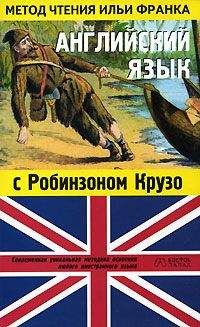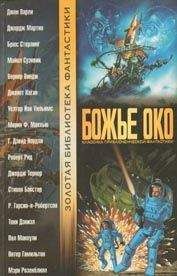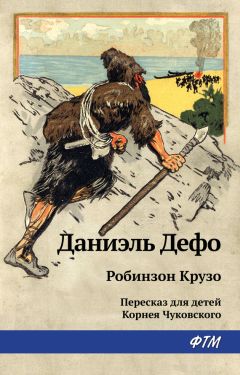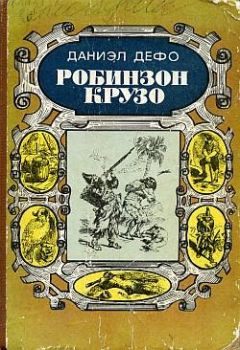James Baldwin - Английский язык с Робинзоном Крузо (в пересказе для детей) (ASCII-IPA)
At last I broke out (наконец я разразился /плачем/; to break out — вспыхивать, разражаться /о грозе, огне и т. п./), crying like a child (плача как ребенок). Then we rejoiced together (затем мы вместе порадовались).
When he had talked awhile (после того, как он проговорил какое-то время), the captain told me that he had brought me a present (капитан сказал, что он принес мне подарок).
"Bring up the box for the governor (принесите сюда ящик/коробку для губернатора)!" he cried to his men (крикнул он своим матросам).
They came up the hill (они поднялись на холм), carrying a wooden chest (неся деревянный ящик). When it was put down in my castle (когда он был поставлен на землю в моем замке) the captain bade me open it (попросил меня открыть его; to bid — просить /уст./) and help myself to all that was inside it (и воспользоваться всем, что было внутри него).
I did so (я так и сделал).
I found first two pounds of good tobacco (я нашел, прежде всего, два фунта хорошего табака), then twelve pieces of beef (затем двенадцать кусков говядины), six pieces of pork (шесть кусокв свинины), a bag of peas (мешок гороха), a box of sugar (ящик сахара), a box of flour (ящик муки), a bag full of lemons (мешок, полный лимонов), and two bottles of lime juice (и две бутылки сока лайма).
But under these was the greatest surprise (но среди всего этого было самое большое удивление = сюрприз). There I found six new shirts (я обнаружил шесть новых рубашек), six neckties (шесть галстуков), two pairs of gloves (две пары перчаток), a pair of shoes (пару туфель), a pair of stockings (пару чулок), a hat (шляпу), and a very good suit of clothes (и очень хороший костюм).
I could now dress like a man again (теперь я мог вновь одеться как человек).
I went about it at once (я принялся за это сразу же). It had been so long since I had worn such clothes (прошло столь долгое время с тех пор, когда я носил такую одежду; to wear — носить /одежду, обувь/) that I was very awkward at putting them on (что я был очень неловок, одевая ее).
But at last I came out fully dressed (но в конце концов я вышел полностью одетый). Friday did not know me (Пятница не узнал меня). I hardly knew myself (я сам едва узнавал себя).
The next day all was in readiness to sail away (на следующий день все было готово к отправлению; readiness — состояние готовности; ready — готовый).
The second mate, the carpenter (второй помощник, плотник), and other ruffians who had been foremost in the rebellion (и другие негодяи, которые были первыми в восстании = зачинщиками восстания; foremost — передний, передовой, находящийся впереди других; самый главный) were to be left on the island (должны были быть оставлены на острове). In fact, I had put the matter to them in such a way that they requested this as a favor (на самом деле я представил им дело так, что они попросили об этом, как об одолжении/о милости).
"It will be better to stay here than be taken to England to be hanged (будет лучше остаться здесь, чем быть отвезенными в Англию, чтобы быть повешенными)," I said to them (сказал я им).
I left with them a keg of powder (я оставил с ними = им бочонок пороха), three muskets, and three swords (три мушкета и три шпаги).
I told them also about my goats (я рассказал им также о моих козах), and how I managed them (и как я управлялся с ними) — how I milked them (как я доил их) and made butter and cheese (и делал масло и сыр).
I showed them my fields of barley and rice (я показал им мои поля ячменя и риса).
I showed them, also, my castle (я показал им также мой замок), my cave in the woods (мою пещеру в лесу), and my bower (и мою беседку).
"All these are yours (все это — ваше)," I said.
"They are much more than we deserve (это намного больше, чем мы заслуживаем)," said the second mate (сказал второй помощник); and I agreed with him (и я согласился с ним).
suit ['sju:t], mouth ['mauT], rejoice [rI'dZOIs], juice [dZu:s], necktie ['nektaI], gloves [glVvz], rebellion [rI' [email protected]], request [rI'kwest], agree [@'gri:]
I HAVE A NEW SUIT OF CLOTHES
THE next morning I slept quite late in my hammock, for the night had been full of toil and I had had but little rest.
All at once I was awakened by the sound of a gun. Then I heard some one calling me, "Governor! Governor!" It was the captain's voice.
I hurried out.
He grasped my hand and pointed to the sea. There, a little way from our beach, was the ship.
The weather being fair, the men had brought her around and anchored her near the mouth of the river.
"My dear friend," cried the captain, "there is your ship! She is all yours, for we owe our lives to you. We also are yours. Everything on board of her is yours."
I was ready to sink down with surprise.
For here was a large ship, at last, ready to carry me wherever I wished to go.
At first I could not answer him.
We stood for some minutes with our arms around each other, and neither of us could speak.
At last I broke out, crying like a child. Then we rejoiced together.
When he had talked awhile, the captain told me that he had brought me a present.
"Bring up the box for the governor!" he cried to his men.
They came up the hill, carrying a wooden chest. When it was put down in my castle the captain bade me open it and help myself to all that was inside it.
I did so.
I found first two pounds of good tobacco, then twelve pieces of beef, six pieces of pork, a bag of peas, a box of sugar, a box of flour, a bag full of lemons, and two bottles of lime juice.
But under these was the greatest surprise. There I found six new shirts, six neckties, two pairs of gloves, a pair of shoes, a pair of stockings, a hat, and a very good suit of clothes.
I could now dress like a man again.
I went about it at once. It had been so long since I had worn such clothes that I was very awkward at putting them on.
But at last I came out fully dressed. Friday did not know me. I hardly knew myself.
The next day all was in readiness to sail away.
The second mate, the carpenter, and other ruffians who had been foremost in the rebellion were to be left on the island. In fact, I had put the matter to them in such a way that they requested this as a favor.
"It will be better to stay here than be taken to England to be hanged," I said to them.
I left with them a keg of powder, three muskets, and three swords.
I told them also about my goats, and how I managed them — how I milked them and made butter and cheese.
I showed them my fields of barley and rice.
I showed them, also, my castle, my cave in the woods, and my bower.
"All these are yours," I said.
"They are much more than we deserve," said the second mate; and I agreed with him.
I BRING MY TALE TO A CLOSE
(я привожу мой рассказ в завершению = завершаю мой рассказ)
AND SO on the 19th of December, 1687 (и таким образом, 19-го декабря 1687 года), we set sail for England (мы отправились в Англию; to set sail — отправляться в плавание). I had been on the island twenty-eight years, two months, and nineteen days (я пробыл на острове двадцать восемь лет, два месяца и девятнадцать дней).
I took on board with me the money (я взял на борт с собой деньги) that had been by me so long (которые были у меня все это время) and had been so useless (и были столь бесполезными/ненужными).
I took also my big goatskin cap and my umbrella (я взял также мою большую шапку из козьей шкуры и мой зонтик). Neither did I forget my good Poll Parrot (не забыл я и моего попугая Попку). As for my man Friday, nothing in the world could have parted him from me (что касается моего слуги Пятницы, ничто в мире не могло разлучить меня с ним). He would have gone to the ends of the earth with me (он бы пошел со мной на край земли).
The voyage was a long and hard one (путешествие было длинным и тяжелым). But on the eleventh day of June we at last reached London (но одиннадцатого июня мы наконец достигли Лондона). Once more I was in England (снова: «еще раз» я был в Англии), the land of my birth (в стране моего рождения).
I was as perfect a stranger as if I had never been there (я был столь же совершенным чужаком/чужестранцем, как если бы я никогда там не бывал). I went down to York (я отправился в Йорк; down — вниз; означает также движение от центра к периферии, из столицы в провинцию). My father and mother had been dead a long time (мои отец и мать давно уже умерли: «были мертвы уже долгое время»). The friends of my boyhood had forgotten me (друзья моего детства забыли меня; to forget — забывать).
I was alone in the world (я был один/одинок в мире). Where should I go and what should I do (куда мне отправиться и что мне делать = чем заняться)?
By chance I learned that my plantation in Brazil was doing well (случайно я узнал, что дела на моей плантации в Бразилии идут хорошо). The man whom I had left in charge of it (человек, которого я оставил управлять ею; charge — забота, попечение, надзор, наблюдение) had made much money from the tobacco he had raised (нажил хорошие деньги: «сделал много денег» на табаке, который он выращивал).
He was an honest man (он был честным человеком), and when he heard that I was still alive (и когда услышал, что я еще жив) he wrote me a long, kind letter (написал мне длинное, доброе письмо; to write — писать). In this he gave me a full account of the business (в нем он дал полный отчет о бизнесе).
He also sent me a large amount of money (он также послал мне большую сумму денег), which I was very glad to get (которую я был очень рад получить).
I was now a rich man (теперь я был богатым человеком). I might have settled down to a life of ease and idleness (я мог бы теперь вести жизнь, полную беззаботности и праздности; to settle /down/ — поселить/ся/, водворить/ся/, обосноваться; перейти к оседлому образу жизни; остепениться); but such was not my wish (но не таково было мое желание).
Soon I was wandering from one place to another (вскоре я начал ездить/путешествовать с одного места в другое), seeing more of the world (видя больше от мира = чтобы посмотреть мир еще больше). I had many surprising adventures (у меня было много удивительных приключений), I assure you (уверяю вас); but I need not tell you about them (но мне не нужно = не стоит рассказывать вам о них). You would think any account of them very dry reading (всякий отчет = рассказ о них покажется вам очень сухим) compared with the story I have already related (по сравнению с историей, которую я уже рассказал).




